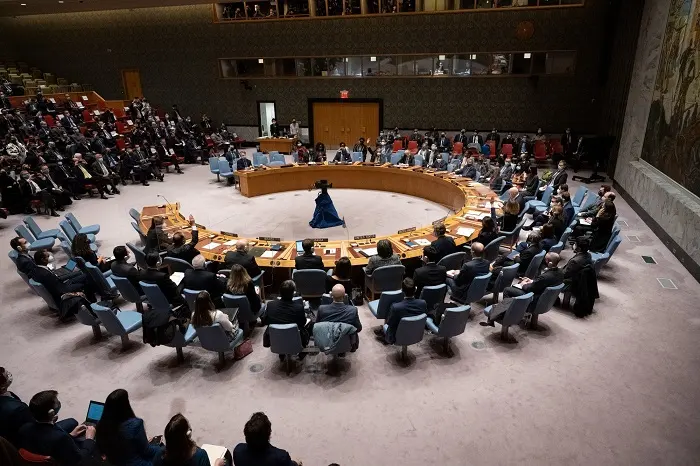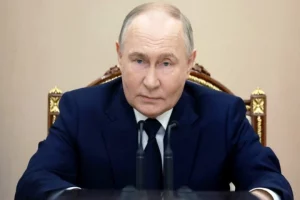The United Nations Security Council (UNSC) failed to adopt a draft resolution on ending the Ukraine crisis in New York earlier today.
The draft, submitted by the United States and Albania, garnered support from 11 members but was vetoed by Russia which is currently holding the rotating presidency of the Council. India, China and the United Arab Emirates abstained from the vote.
The vote followed two late-night UNSC emergency meetings on the situation in Ukraine, on February 21 and 23. Russia had announced a "special military operation" in eastern Ukraine while the second emergency meeting was in session.
What was the draft resolution all about?
By the draft, the 15-member Council would have deplored, in the strongest terms, Russia's military offensive against Ukraine and also allowed the Council to decide that Moscow should immediately cease its use of force against Kiev. If adopted, it would have also asked Russia to "immediately and unconditionally reverse" its decision on the status of Donetsk and Luhansk regions in eastern Ukraine. The Council would have also called upon the parties to abide by the Minsk agreements and to work constructively in relevant international frameworks.
What did India say?
Ambassador T S Tirumurti, India's Permanent Representative to the United Nations said that New Delhi is "deeply disturbed" by developments in Ukraine and called for efforts to ensure an immediate cessation of hostilities. He emphasised that dialogue is the only way to settle disputes, "however daunting that may appear at this moment". India also expressed regret that diplomacy was abandoned while calling for a return to that path. It was for these reasons, Tirumurti said, that India has chosen to abstain from the vote.
What was China's explanation?
China's representative Zhang Jun said that he abstained because the Council's response should be taken with great caution, with actions to defuse and not add fuel to the fire. Stressing that the security of one country cannot come at the cost of that of another, he said Ukraine should be a bridge between the East and the West, not an "outpost for major powers".
Why does India's stand matter?
Experts reckon India's abstention is aimed towards securing long-term peace and stability in the region and beyond. New Delhi, which sees Moscow as a long-standing partner – and at the same time, enjoys a strong strategic partnership with the US and France (which is working hard towards de-escalating tensions) – has strongly emphasised the need for all sides to exercise the utmost restraint and intensify diplomatic efforts to ensure for a mutually amicable solution. Unlike China, which cited NATO's eastward expansion and Russia's "legitimate" security aspirations, India has stressed on taking into account the legitimate security interests of all countries and bridge divergent interests.
In UN Security Council meeting on #Ukraine today, India abstained on the vote on draft resolution.
Our Explanation of Vote ⤵️ pic.twitter.com/w0yQf5h2wr
— PR/Amb T S Tirumurti (@ambtstirumurti) February 25, 2022
Why did Russia wield the veto?
Vassily Nebenzia, Russia's Permanent Representative to the United Nations and also the Council President for February, called the resolution "another brutal move" on the chess board. He said that the resolution runs counter to the interests of the Ukrainian people — who have experienced a tragedy over the last eight years. Russia stated that the negative vote is due to what was left out of the text: that those who seized power in the coup of 2014 had shelled the people of Donetsk and Luhansk; that Ukraine, with the West's support, did not implement the Minsk agreements; and that neo-Nazis and militias continue to kill civilians, adding to such blood-chilling crimes as sniper attacks on Maidan protestors.
What other countries said?
Kiev's Permanent Representative, Sergiy Kyslytsya, recalled multiple instances when his Russian counterpart "denied intention of invasion", adding: "Your words have less value than a hole in a New York pretzel". Barbara Woodward, the United Kingdom's delegate, noted that whereas a large majority of Council members voted in favour of a draft resolution aimed at stopping war, the text was not adopted because of a single veto by a permanent member who perpetrated that conflict. Recalling that the Council was created to prevent exactly this kind of aggression, US Ambassador to the UN Linda Thomas-Greenfield said that everyone has a solemn obligation to not look away.
Also Read: Left alone to defend itself, Ukraine now ready to hold talks with Russia on neutral status




















